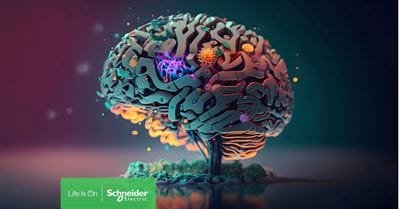Schneider Electric Launches AI-Powered Ecosystem for Sustainability and Energy Management
Schneider Electric is embarking on a multi-year initiative to build an AI-driven ecosystem for sustainability and energy management. This initiative aims to foster collaborative intelligence and deliver results that propel the market forward, while also advancing digital innovation, energy management, and sustainability. Julien Picaud has been appointed as the new Chief Product Officer to lead this effort.
The new integrated ecosystem is supported by a growth model that reflects the company’s commitment to creating innovative software solutions. At the heart of this venture is Agentic AI technology, a new type of software designed to operate independently or in collaboration with customers and consultants. This technology can anticipate needs and adapt to complex environments in real-time, ushering in a new era of simplification and automation in sustainability. Unlike traditional software used as a tool to assist with tasks, this initiative utilizes built-in AI agents to manage the work itself.
The AI ecosystem will redefine energy management and sustainability by serving as both a command center and a coordination layer for strategy and decision-making. By integrating AI agents into adaptive workflows that integrate with human experts and enterprise systems, isolated sustainability efforts will transform into a cohesive ecosystem. This, in turn, provides continuity, optimizes outcomes, and creates lasting sustainable impacts.
Our vision is to develop collaborative intelligence, where AI agents work alongside human experts. This technology enables us to create a multiplier effect, automating complex data analysis and tasks. Our customers can then focus on the strategic initiatives and innovations that lead to increased impact. We see this as a fundamental shift in how organizations can accelerate their energy journey towards fossil-free fuels, says Steve Wilhite, President, Schneider Electric’s Sustainability Business division.
To spearhead this initiative, Schneider Electric has appointed Julien Picaud as the head of product management. Picaud brings a background in strategic leadership, product management with a focus on digital innovation, and AI-driven initiatives that have improved both business operations and resource and emissions management. The investment will redefine the functionality of Schneider Electric’s existing software platforms, while also introducing new features from the recently acquired sustainability firm, EcoAct.
The new features include:
- Fossil fuel phase-out strategy
- Scenario analysis
- Benchmarking analysis
- Emissions management
- Reporting & compliance
- Climate risk assessment
- Value chain engagement
- Energy and resource management
- Data integration, automation, and visualization
- Modernized user experience
For over two decades, Schneider Electric has assisted thousands of multinational corporations in achieving their energy and sustainability goals. This market-leading expertise forms the foundation of the new ecosystem, enabling customers to leverage the company’s breadth and depth, bringing together the best of both human and artificial intelligence.
In specialized areas like energy and sustainability, AI is only as effective as the expert knowledge that underlies its development. With over 20 years of experience and a team with extensive industry expertise, Schneider Electric is developing an advanced AI ecosystem that sets a new standard for sustainability management. This ecosystem enables organizations to manage increasingly complex challenges in energy and the environment. Through next-generation AI solutions, data management is transformed into concrete, actionable systems that support a sustainable future, says Amy Cravens, Research Director, Sustainability and ESG Software, IDC.
Schneider Electric’s global work in sustainability and ethics has led to accolades such as being named the world’s most sustainable company by Corporate Knights. They have also been repeatedly recognized as one of the world’s most ethical companies. This provides a strong foundation for driving the initiative in a responsible and long-term manner.
Given that AI is energy-intensive, it is important that we are involved in developing and implementing this type of investment, with a focus on efficiency and responsible resource use. By integrating the principles of frugal AI, we design systems that deliver maximum intelligence with minimal resource consumption. This means that we utilize more efficient models, optimized algorithms, and infrastructure to reduce energy consumption, emissions, and costs without compromising performance, says Dan Whitsell, CTO & Head of Software Engineering, Sustainability Business division.
The initiative builds on the company’s proven track record of AI innovation, ranging from Resource Advisor Copilot for enterprise-level sustainability insights, a global AI hub that saves $15 million through optimization, over 18 AI patents, to a strategic partnership with Nvidia to prioritize efficiency and sustainability within large-scale data center infrastructure.
Schneider Electric’s purpose is to empower all to make the most of our energy and resources, bridging progress and sustainability for all. At Schneider, this is called Life Is On.
Their mission is to be the trusted partner in sustainability and efficiency.
They are a global leader in industrial technology, bringing world-leading expertise in electrification, automation, and digitalization to smart industries, robust infrastructure, future-proof data centers, intelligent buildings, and intuitive homes. Grounded in deep industry knowledge, they provide integrated, end-to-end solutions with AI-enabled industrial IoT with connected products, automation, software, and services, delivering digital twins to enable profitable growth for their customers.
They are a company for people with an ecosystem of 150,000 colleagues and over a million partners operating in over 100 countries to ensure proximity to their customers and stakeholders. They embrace diversity and inclusion in everything they do, guided by their meaningful purpose of a sustainable future for all.
Enjoyed this post by Thibault Helle? Subscribe for more insights and updates straight from the source.


